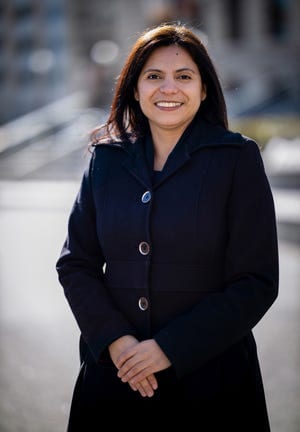Community members hailed City Manager Edward M. Augustus Jr.’s recommendation to amend the city’s organizational ordinances to create the seven-member commission, which will be responsible for encouraging, promoting and monitoring policies in the city that impact Latinos.
$1 for 6 months:Introductory telegram.com offer for new subscribers
They also gave credit to the Latino Empowerment and Organizing Network, or LEON, and other Latino-led groups that partnered with the city administration on developing the idea of a commission to ensure Latinos in the city have equal access to public services and the full enjoyment and exercise of their civil rights.
Procedurally, the city manager’s proposal to create the commission goes to subcommittee for a public hearing before it comes back to the council for final approval.

Hilda Ramirez, executive director of the Latino Education Institute and a representative of LEON, said the Latino community is committed to working with the city to get the commission up and running.
Gina Plata-Nino, a lawyer with the Central West Justice Center who has also been involved with LEON, said an advisory commission was a specific recommendation that grew out of meetings of a multi-sector coalition that looked at issues facing the Latino population in the city.
She said statewide, Massachusetts ranks among the worst in the country when it come to inequities between Latinos and whites. She said she hopes the commission will tackled those inequities.
Louis G. Pedraja, president of Quinsigamond Community College, said Latinos make up the largest minority group in the city, with about 40,000 residents. And while that number is growing, systemic issues still impact the community, he said, noting that since the COVID-19 pandemic started, the area has seen fewer Blacks and Latinos attending college.
Mayor Joseph M. Petty thanked Augustus Tuesday for moving forward with creating the commission, which he noted was one of the recommendation of a task force he led on Latino education.
“It’s the right time, and it’s needed,” Petty said. “They represent a large percentage of the community. We need them to succeed for the city of Worcester to succeed.”
District 4 Councilor Sarai Rivera thanked the community for remaining committed. She said the data on inequities that impact the Latino community is heartbreaking, by eliminating barriers to education, economic development, and health, the city can do something about it.
She said the pandemic has allowed other people to see what minority communities have experienced all along. But she said the creation of the commission is a start toward something that gives the community a sense of home, in the midst of great challenges.
At-large Councilor Khrystian King said the commission’s stated aims to make the city a more equitable place to live intersected with plans underway to change the all at-large School Committee electoral system to settle a lawsuit that alleged the longstanding practice was discriminatory.
He said LEON has been a great partner with the city, and he said the Latino Advisory Commission will bring an additional level of accountability to the City Council.
District 1 Councilor Sean Rose said he enthusiastically supported the creation of the commission; he said it presents an opportunity for significant change in the city.
Columbus Park item sparks discussion
Resident David Slatkin petitioned the council Tuesday to use $3.5 million in American Rescue Plan Act funds to pay for a repairs to the heating/ventilation/air conditioning system at Columbus Park Preparatory Academy.
Slatkin said the city has known the HVAC system is in need of repairs and upgrades since 2019, when a state Department of Public Health assessment found elevated levels of carbon dioxide in the nearly century-old school.
The School Department at the time pledged to implement short-term measures to alleviate air quality and circulation issues — it found that air quality in the school was fine by most measurements — but Slatkin and neighborhood residents Tuesday said it’s time for a more permanent solution.
Slatkin said using ARPA funds to improve the health of students and faculty at the school, which has a large population of students from communities of color, would be appropriate.
Slatkin’s petition sparked a council discussion. Petty asked for updates on air quality upgrades at Columbus Park and other schools, while King said he didn’t want the original petition to get watered down.
At-large Councilor Kathleen M. Toomey said she wanted to get an update of where the school district stands on air quality improvements; she said some of the issues originally brought up may have already been addressed.
Ultimately, the council voted to request more reports from the administration, and to refer the petition to the School Committee and the council’s education subcommittee.
Fiscal 2022 finances finalized
In a relatively routine fiscal 2022 budget adjustment request, Augustus asked this week for the council’s approval to update the budget to reflect additional free cash, new growth, state aid, ARPA spending and other adjustments.
One of those adjustments cited by Augustus in the communication to the council was nearly $200,000 in ARPA funding to partially pay for the $1.5 million police body camera program, which is slated to come online next year.
Residents spoke out last week against using ARPA funds for the body cameras, although Petty pointed out last week that the city has used ARPA funds to recover lost revenue. That money went into the city’s general fund, and the $200,000 to partially pay for the body camera program came from that funding source, not directly from ARPA, the mayor said last week.
According to Augustus’ communication to the council, the $200,000 recommended for the body cameras represents a small percentage of the planned $7.1 million spending from the ARPA revenue recovery funds, which also includes $6.4 million for street and sidewalk improvements, and $500,000 for a Fire Department capital outlay for safety equipment for incoming firefighter recruits.
King held the communication last week, but Tuesday, the council approved the overall spending plan. King unsuccessfully tried to cut $200,000 from the budget. He said the city could figure out another way to secure the $200,000 for the body cameras. His motion failed.
Facial recognition ban, surveillance
The council voted to advertise an ordinance banning facial recognition software, and supported an executive order establishing a policy for acquiring and using surveillance technology. King said he supported the executive order, but had concerns that with its language, it limited council oversight.
City Solicitor Michael Traynor explained that the executive order was necessary because an ordinance would have run afoul of the city charter that prevents the council from giving direct advice to the city administration — that has to come from the city manager.
The two initiatives were part of Augustus’ slate of reforms he presented earlier this year aimed at dismantling structural and institutional racism in the city.
Consent decree cost inquiry scuttled
An order from at-large Councilors Morris A. Bergman and Donna M. Colorio asking for a report on the projected costs of implementing and maintaining each of the three options for electing the School Committee starting in 2023 drew rebukes from King, Rose, and Rivera.
The council entered into a consent decree to settle a federal lawsuit that alleged that the all at-large system of electing the School Committee violated the Voting Rights Act. As part of the consent decree, the council next week is slated to choose one of three district-based options moving forward.
Bergman said councilors can’t be making decisions in the dark, and said additional school committee members means additional costs. That may inform some councilors’ decisions, he said.
King said you can’t put a value on democracy, equity, or ensuring that the Voting Rights Act is not violated. He said the council voted on exactly the process that is currently unfolding.
Rose said he didn’t fully understand how costs would play a role in deciding what direction the council headed. He said when the council decided to move forward, it agreed to equality.
Rivera said the motion was offensive and insulting. She talking about the costs was a way to deflect away from the real issues of longstanding inequities involving the education of children of color.
Rose motioned to file the item, which essentially kills it.
Rose, King, Rivera, Petty, District 5 Councilor Matthew Wally, District 3 Councilor George Russell, at-large Councilor Gary Rosen, and Toomey voted to file the item. Bergman, Colorio, and District 2 Councilor Candy Mero-Carlson — the three councilors who voted against entering into the consent decree in October — voted against filing the item.
The final public hearing of the Municipal and Legislative Operations Committee on the three options for electing the next School Committee will be held at 6 p.m. Wednesday at the Worcester Youth Center, 326 Chandler St.

